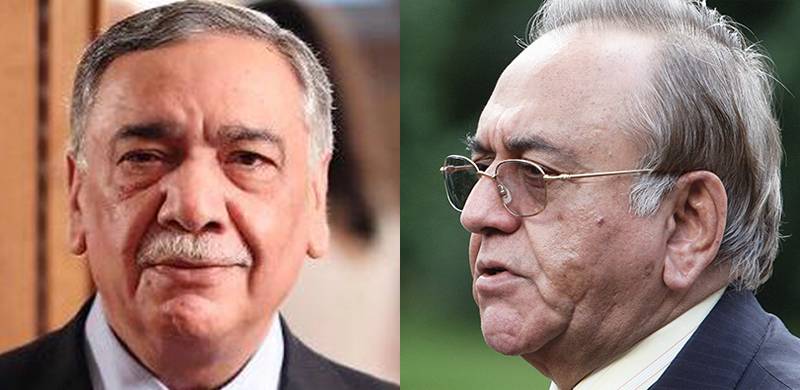
This is the full version of letter written by former Foreign Minister of Pakistan Khurshid Mahmud Kasuri to Chief Justice of Pakistan Mr Asif Saeed Khosa.
Dear Mr Chief Justice:
Let me congratulate your lordship on the assumption of the high office of the Chief Justice of the Supreme Court of Pakistan. Your elevation is richly deserved, because, apart from your academic background and legal experience, you have authored judgments, some of which have the potential of putting your own person at risk. Courage, after all, is one of the most important qualities of a good judge.
Although, I am not a practicing lawyer, I feel passionately about the views being expressed in this letter to you. These views are not new; I had expressed these views in my book ‘Neither a Hawk, Nor a Dove’ published in 2016 which basically deals with the foreign policy of Pakistan. A chapter on the Pakistan Army, however, does cover the subject (pages 452-475) relating to the reference sent against Chief Justice Iftikhar Muhammad Chaudhry by the then President, Gen. Pervez Musharraf. I advocated in that book that ‘while the Supreme Court should continue to fulfill its strictly constitutional role, it should resist viewing itself as the platonic guardian justifying activist judicial intervention.’ I am now compelled to use this medium of an open letter to your lordship in view of certain recent judicial actions and pronouncements which have greatly disturbed me and many others.
I sent my letter of resignation to President Musharraf despite reservations about Iftikhar Chaudhry
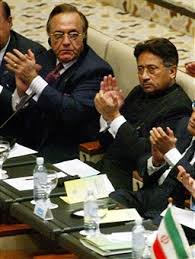
I come from a family with three generations of lawyers. My late father, Mian Mahmud Ali Kasuri was himself a legal icon, a champion of human rights and called by some as ‘Mr Law’. My father was very keen that I should become a practicing lawyer and that is why after graduating from Government College Lahore, he sent me to Cambridge to read law. Later on I was also called to the Bar. It makes me happy that at least, in this respect you and I have something in common. It is a different matter that I did not actually practice law, but, at that time, the judges and the legal profession were held in such high repute that being the son of an illustrious lawyer filled me with enormous pride. I could not escape my father’s shadow even at the time when I was Foreign Minister when the then President Musharraf issued a Proclamation of Emergency. I sent my letter of resignation to President Musharraf despite my grave reservations about the conduct of Chief Justice Iftikhar Chaudhary.
Some great judges who I came to know personally
I often used to hear from my father about the traits of some of the great judges that he had dealt with. Among others, these included outstanding Pakistani judges like honorable Justices Sir Abdul Rashid, A.R. Cornelius, M.R. Kayani and Lord Diplock, the distinguished British judge. I also came across and got to personally know and admire many great lawyers of the day like Messrs. Huseyn Shaheed Suhrawardy, Manzur Qadir, A.K. Brohi, M. Anwar and other such luminaries who often met my father. It is this background—and certain recent events which have disturbed me and many other well-wishers of the judiciary—which compels me to make these heart-felt submissions before your lordship.
Judicial Activism: Mr. Chief Justice, judicial review, exercised scrupulously within constitutional parameters is definitely justified in checking the excesses of the executive. It is, however, equally incumbent on the judiciary to exercise restraint and not encroach on the functions and powers reserved for the other two organs of State. In a written constitution like ours, judges are empowered to interpret the law in a stable and predictable manner. They crucially are not mandated to make law or act in their unfettered discretion outside the scope of their enumerated powers.
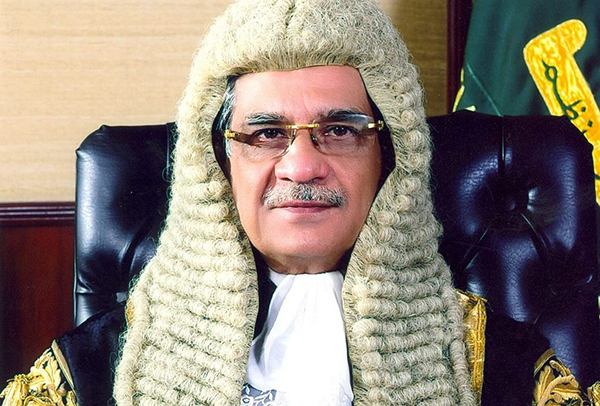
I still stand by what I said in my book that where there are genuine cases of executive and legislative failure to enforce fundamental rights in matters of public importance, the Supreme Court may as a last resort justifiably exercise its suo motu powers as per the Constitution’s Article 184 (3). What cannot be condoned though is its sweeping scope and unbridled use which undermines the functioning of lower courts, and cannot be squared with the Constitution’s Article 10-A due process guarantees or with rights of appeal. Moreover, while ‘suo motus’ may momentarily highlight issues, they are ill-suited to fixing them permanently and in fact may make matters worse because judges are not experts in different fields of governance. Their expertise lies in the field of law.
Mr. Chief Justice, it pains me to write what follows since former Chief Justice Mian Saqib Nisar has a reputation for integrity and legal expertise. I would also like to believe that he is well meaning but, even well-meaning actions, unless completely and thoroughly thought through, can wreak disastrous consequences. It does not require a sage to predict that such impulsive, impetuous and ‘popular’ actions will not stand the test of time. Let me state with great respect that no one in any branch of government can defy the laws of economics. Of course, the entire socio-economic and political system can be changed; for that, however, you need a bloody revolution as in France in 1789 and in Russia in 1917. Anyone in a position of authority who has been seized by the ultimately self-defeating ‘Man on the Horseback Syndrome’ or ‘Canute Complex’ (King Canute was convinced by his flattering courtiers that he could stop the rising river tide by just standing in front of it.) has ended up doing greater harm than good.
Bureaucrats complained how suo motu actions were wasting their time and compromising dignity
During the tenure of the former Chief Justice Iftikhar Chaudhry, there were complaints from senior bureaucrats that he interfered in their work excessively. Moreover, he had a habit of summoning them and then making them wait for hours, wasting their productive time besides compromising their dignity. Officials posted outside Islamabad complained that a lot of their time was being wasted by being made to travel back and forth to Islamabad, something that had rarely been done in the past by any Chief Justice. To make matters worse, he ensured that his comments were made in the presence of the entire media in order to gain popularity among the masses. Thus, ‘trial by the media’ became a constant complaint during his tenure. Replicating CJ Iftikhar Chaudhry’s playbook, CJ Saqib Nisar ushered in a reign of suo motu driven judicial activism and remained in the news 24/7, often grabbing top headlines. Perhaps he made more news than the Prime Minister! It appeared that neither the executive nor the parliament mattered. The civil government cannot, it seems, even fix the date for Mohmand Dam's inauguration. This is not what is envisaged or the norm in a constitutional democracy.
By failing to institute meaningful judicial reforms, tailored to address the grievances of ordinary litigants and also as a result of the allegations against his son, Justice Iftikhar Chaudhry’s popularity and, sadly and unfortunately, the Court’s prestige suffered. The proactivity of Chief Justice Nisar in political and economic affairs is discounted with his own acknowledgment, “I admit openly that I have been unable to put the house in order.”
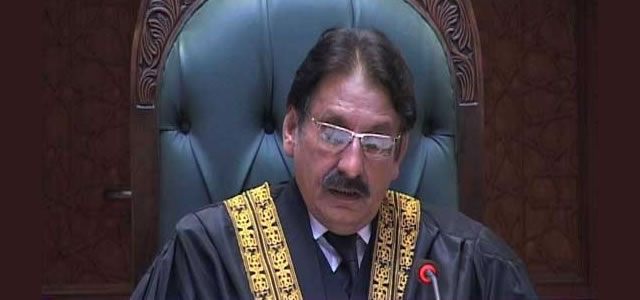
One of the unfortunate cases taken up by former Chief Justice Iftikhar Chaudhry was the suo motu notice of a bottle of wine allegedly found in the luggage of a person considered a supporter of former President Musharraf. The inevitable backlash to the Court’s unrestrained exercise of its suo motu powers led CJ Iftikhar Chaudhry’s successors, Chief Justice Tassaduq Hussain Jillani, Chief Justice Nasir-ul-Mulk and Chief Justice Anwar Zaheer Jamali to adopt a balanced approach by restricting its exercise and prudently distancing the court from the media glare.
Economic effects: Mr. Chief Justice, consider, your lordship, the recent judicial interventions in economic and fiscal policy including suspension of tax deductions on mobile cards. Among other negative consequences, the tax rebate has weakened the government’s bargaining position vis-à-vis international lending institutions. Such judicial manipulations of free market and regulatory mechanisms have chilled investor and business confidence precisely when to kick-start the economy the Prime Minister is trying to lure investment and generate a business-friendly environment. It is widely known that an investor of Pakistani origin left the country after his demeaning encounter with the Chief Justice. This attitude has also caused near-paralysis in the bureaucracy and almost a pen-down strike.
The losses incurred by Pakistani taxpayers due to judges' hyper-activism
Astonishingly, in shunting aside the perils of judicial economic policymaking time and again, no lessons are heeded from past economic debacles caused by judicial decisions in the Pakistan Steel Mills (PSM), Reko Diq and Rental Power Plant (RPP) cases. Eminent lawyer and former Law Minister, Khalid Anwar has persuasively termed the Court’s 2006 decision halting PSM’s privatization ‘a bad verdict.’ At the time, I was trying to attract the Russian government on tripling the capacity of steel mill and I had very useful discussions with my Russian counterpart Foreign Minister Sergey Lavrov who showed great keenness in the project. The Court’s decision put an end to all such efforts. As it is, the Court’s decision has swelled the Steel Mill’s losses to over Rs. 200 billion and counting! Meanwhile, the Court’s decisions in RPP and Reko Diq cases have been disregarded by international arbitration awards, imposing on us damages of $700 million in the RPP matter and potentially exposing us to damages of astronomical amounts in the Reko Diq matter. In many such cases, Chief Justice Iftikhar Chaudhry was fond of using the expression ‘let heavens fall but justice will be done’ (Fīat jūstitia ruat cælum). It has been pointed out that this Roman maxim is of dubious origin and does not come from classical sources. Unfortunately, heavens have actually fallen, but, on the poor state of Pakistan which has been burdened by humungous losses and possible back-breaking damages.
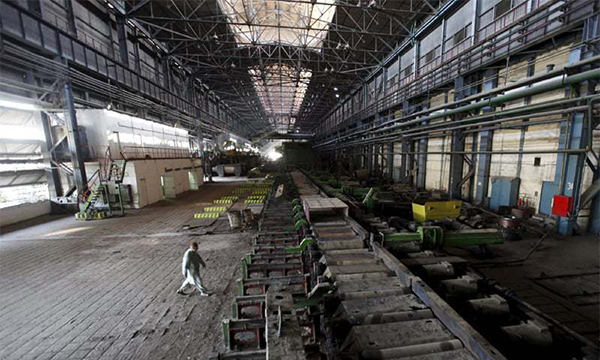
What Hazrat Ali (RA) though a judge should behave like:
Islamic and Western approaches regarding qualities and conduct of judges: Mr. Chief Justice, as you are very well aware, in a most eloquent exposition on the hallmarks of a good judge, Hazrat Ali (RA) writing to one of his governors said: “Select as your judge one who cannot be intimidated; one who is not self-centred or avaricious; one who will not decide before knowing the full facts; one who will weigh with care every attendant doubt and pronounce a clear verdict after taking everything into full consideration; one who will not grow restive over the arguments of ‘advocates’ (موید دافع one who defends, supports/endorses) one who will examine with patience every new disclosure of facts; one who will be strictly impartial in his decision; one whom flattery cannot mislead; one who does not exult over his position.”
Similarly, since at least as far back as the Enlightenment, western legal theory has associated judicial temperament with absence of anger, which may unseat rationality and distort judgment. According to Thomas Hobbes (the great English political philosopher who has also written on Jurisprudence) judges should be free “of all anger and hatred,” and Judge Richard A. Posner (one of the most cited legal scholars) insists that we ought to “beware…the angry judge!” It is thus important for judges to keep their emotions in check and demonstrate civility to help display that they are trying to make the decision impartially and dispassionately, on the basis of law and not their desires or emotions.
Hussain Naqi's case
In the light of the above, particularly, Hazrat Ali’s great wisdom, I am saddened when a Chief Justice reprimands distinguished lawyers for representing thieves ‘chors’ (isn’t there a presumption of innocence until the final judgment?) It is the duty of a lawyer to defend his client to the best of his ability and legal acumen because it is the judge who will pronounce the judgment. This is axiomatic.
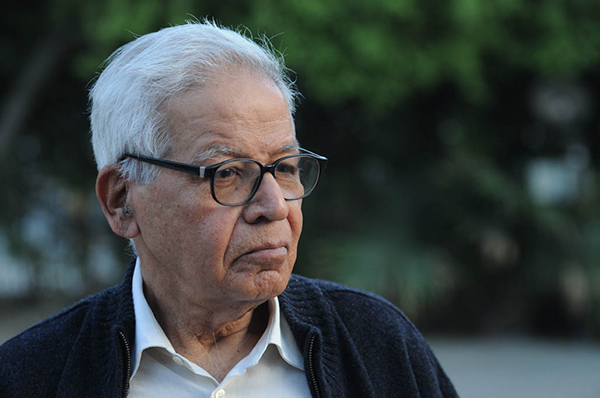
I have been told by journalists and others that the respected journalist of unimpeachable integrity, Mr Hussain Naqi in his late 80s, was addressed as ‘tum’ by the former CJ Nisar. Mr Naqi naturally objected to being addressed in such a manner. I was horrified as was the entire community of journalists at this treatment meted out to a man who has defied many a dictator. Chief Justice only relented when the journalist community jointly raised their voice against such treatment of Mr Naqi.
Desire to remain in the media: Mr. Chief Justice, it is commonly said that judges should lead the life of a recluse; perhaps, for this reason the names of the judges in England did not appear in a telephone directory. Contrast this to the desire by some judges to remain in the news in the age of 24/7 television. It is well known that judges best speak through their judgments.
I was also struck by the fact that Chief Justice Mian Saqib Nisar actually invited Prime Minister Imran Khan to share a stage with him, undoubtedly for a noble cause. PM Imran Khan has great star appeal (the only other politician in Pakistan’s history who matches his star appeal is the late Mohtarma Benazir Bhutto) and he has a proven record of collecting funds for noble causes. It is widely known that the first Chief Justice of Pakistan, Sir Abdul Rashid refused to meet Prime Minister Nawabzada Liaquat Ali Khan because he felt that it violated the principle of the independence of the judiciary, as well as, that of trichotomy of powers.
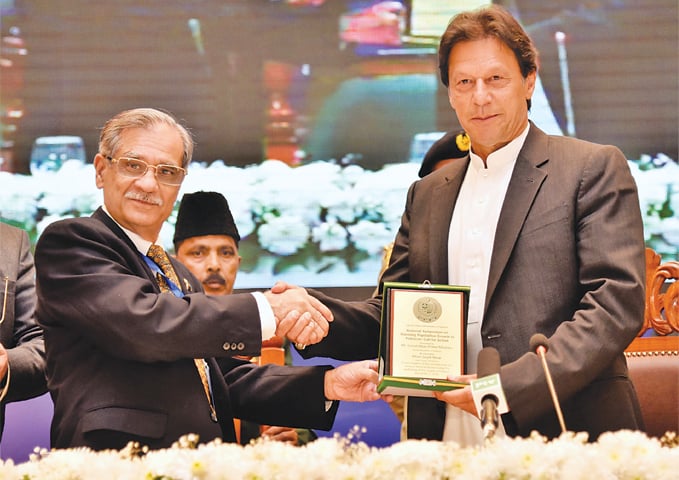
Predictability of Law: Mr. Chief Justice, our judicial system is comprised of courts of law whose powers and legitimacy are strictly derived from within the bounds of the constitution. Our courts thus should not attempt to act like the old courts of ‘equity’ in England. In this connection, the classic maxim of British constitutional law cautions that “Equity is a roguish thing: for law we have a measure, know what to trust to; equity is according to the conscience of him that is Chancellor (‘equity varies with the size of Chancellor’s foot’). Recently, a very well-known senior advocate of the Supreme Court made me speechless when he told me that while CJ Nisar was about to take a decision, the lawyer concerned pointed out that what the Chief Justice was contemplating could not be supported by law, the Chief Justice said words to the effect that “it is law if we say it!”
Certain valuable lessons may also be drawn from US constitutional history. Since Justice John Marshall’s landmark ruling in Marbury v. Madison (1803) that established the power of judicial review in the US, the US Supreme Court has by and large used it sparingly with a self-imposed restraint.
Contempt of court law: Mr. Chief Justice, recently, we have also witnessed a spate of contempt notices either threatened or actually issued against various people. Judges are not supposed to be known by the example of their power. Rather, their respect emanates from the quality and meticulousness of their judgments.
Some of our great judges showed a lot of restraint in this respect. For example, most of us have heard about the incident when the Quaid e Azam, then, plain Mr Jinnah was addressing a court. After every sentence that Mr Jinnah spoke, the judge uttered the word, ‘rubbish’! Mr Jinnah looked at the judge and said, ‘what seems to be wrong with your lordship/honour today’? Nothing but ‘rubbish’ comes out of your lordship’s mouth’. I remember another incident when my father Mian Mahmud Ali Kasuri was addressing the Supreme Court in a matter involving Air Marshal Asghar Khan who belonged to the then NWFP. My father was not very happy to see only the judges from Punjab sitting on the bench and said, “Your Lordships, am I addressing a bench of the Supreme Court or a bench of the Punjab Court?” Suffice, it is to say that in both cases, judges showed a lot of restraint and neither the Quaid nor my father were served with contempt notices.
Your Lordship’s Legacy:
Dear Mr. Chief Justice, a glorious legacy awaits you. Given your academic credentials and judicial track-record, there is every reason to be sanguine that you will at last undertake tailored reforms which would lead to speedier dispensation of justice besides reviving the legal profession’s sanctity. I have no doubt that you will prudently exercise your judicial review and suo motu powers, as well as lead by example in re-instilling the righteous traits and temperament in our judiciary. In the end, I would like to pray for your success and also that you may leave a legacy which will make the following generations of lawyers and judges look up to your judgments with pride. Only sound judgments stand the test of time.
With best wishes,
Yours sincerely,
Khurshid Mahmud Kasuri
17th January, 2019
Dear Mr Chief Justice:
Let me congratulate your lordship on the assumption of the high office of the Chief Justice of the Supreme Court of Pakistan. Your elevation is richly deserved, because, apart from your academic background and legal experience, you have authored judgments, some of which have the potential of putting your own person at risk. Courage, after all, is one of the most important qualities of a good judge.
I advocated in that book that ‘while the Supreme Court should continue to fulfill its strictly constitutional role, it should resist viewing itself as the platonic guardian justifying activist judicial intervention.’
Although, I am not a practicing lawyer, I feel passionately about the views being expressed in this letter to you. These views are not new; I had expressed these views in my book ‘Neither a Hawk, Nor a Dove’ published in 2016 which basically deals with the foreign policy of Pakistan. A chapter on the Pakistan Army, however, does cover the subject (pages 452-475) relating to the reference sent against Chief Justice Iftikhar Muhammad Chaudhry by the then President, Gen. Pervez Musharraf. I advocated in that book that ‘while the Supreme Court should continue to fulfill its strictly constitutional role, it should resist viewing itself as the platonic guardian justifying activist judicial intervention.’ I am now compelled to use this medium of an open letter to your lordship in view of certain recent judicial actions and pronouncements which have greatly disturbed me and many others.
I sent my letter of resignation to President Musharraf despite reservations about Iftikhar Chaudhry

I come from a family with three generations of lawyers. My late father, Mian Mahmud Ali Kasuri was himself a legal icon, a champion of human rights and called by some as ‘Mr Law’. My father was very keen that I should become a practicing lawyer and that is why after graduating from Government College Lahore, he sent me to Cambridge to read law. Later on I was also called to the Bar. It makes me happy that at least, in this respect you and I have something in common. It is a different matter that I did not actually practice law, but, at that time, the judges and the legal profession were held in such high repute that being the son of an illustrious lawyer filled me with enormous pride. I could not escape my father’s shadow even at the time when I was Foreign Minister when the then President Musharraf issued a Proclamation of Emergency. I sent my letter of resignation to President Musharraf despite my grave reservations about the conduct of Chief Justice Iftikhar Chaudhary.
Some great judges who I came to know personally
I often used to hear from my father about the traits of some of the great judges that he had dealt with. Among others, these included outstanding Pakistani judges like honorable Justices Sir Abdul Rashid, A.R. Cornelius, M.R. Kayani and Lord Diplock, the distinguished British judge. I also came across and got to personally know and admire many great lawyers of the day like Messrs. Huseyn Shaheed Suhrawardy, Manzur Qadir, A.K. Brohi, M. Anwar and other such luminaries who often met my father. It is this background—and certain recent events which have disturbed me and many other well-wishers of the judiciary—which compels me to make these heart-felt submissions before your lordship.
It is, however, equally incumbent on the judiciary to exercise restraint and not encroach on the functions and powers reserved for the other two organs of State. In a written constitution like ours, judges are empowered to interpret the law in a stable and predictable manner.
Judicial Activism: Mr. Chief Justice, judicial review, exercised scrupulously within constitutional parameters is definitely justified in checking the excesses of the executive. It is, however, equally incumbent on the judiciary to exercise restraint and not encroach on the functions and powers reserved for the other two organs of State. In a written constitution like ours, judges are empowered to interpret the law in a stable and predictable manner. They crucially are not mandated to make law or act in their unfettered discretion outside the scope of their enumerated powers.

I still stand by what I said in my book that where there are genuine cases of executive and legislative failure to enforce fundamental rights in matters of public importance, the Supreme Court may as a last resort justifiably exercise its suo motu powers as per the Constitution’s Article 184 (3). What cannot be condoned though is its sweeping scope and unbridled use which undermines the functioning of lower courts, and cannot be squared with the Constitution’s Article 10-A due process guarantees or with rights of appeal. Moreover, while ‘suo motus’ may momentarily highlight issues, they are ill-suited to fixing them permanently and in fact may make matters worse because judges are not experts in different fields of governance. Their expertise lies in the field of law.
Anyone in a position of authority who has been seized by the ultimately self-defeating ‘Man on the Horseback Syndrome’ or ‘Canute Complex’ (King Canute was convinced by his flattering courtiers that he could stop the rising river tide by just standing in front of it.) has ended up doing greater harm than good.
Mr. Chief Justice, it pains me to write what follows since former Chief Justice Mian Saqib Nisar has a reputation for integrity and legal expertise. I would also like to believe that he is well meaning but, even well-meaning actions, unless completely and thoroughly thought through, can wreak disastrous consequences. It does not require a sage to predict that such impulsive, impetuous and ‘popular’ actions will not stand the test of time. Let me state with great respect that no one in any branch of government can defy the laws of economics. Of course, the entire socio-economic and political system can be changed; for that, however, you need a bloody revolution as in France in 1789 and in Russia in 1917. Anyone in a position of authority who has been seized by the ultimately self-defeating ‘Man on the Horseback Syndrome’ or ‘Canute Complex’ (King Canute was convinced by his flattering courtiers that he could stop the rising river tide by just standing in front of it.) has ended up doing greater harm than good.
Bureaucrats complained how suo motu actions were wasting their time and compromising dignity
During the tenure of the former Chief Justice Iftikhar Chaudhry, there were complaints from senior bureaucrats that he interfered in their work excessively. Moreover, he had a habit of summoning them and then making them wait for hours, wasting their productive time besides compromising their dignity. Officials posted outside Islamabad complained that a lot of their time was being wasted by being made to travel back and forth to Islamabad, something that had rarely been done in the past by any Chief Justice. To make matters worse, he ensured that his comments were made in the presence of the entire media in order to gain popularity among the masses. Thus, ‘trial by the media’ became a constant complaint during his tenure. Replicating CJ Iftikhar Chaudhry’s playbook, CJ Saqib Nisar ushered in a reign of suo motu driven judicial activism and remained in the news 24/7, often grabbing top headlines. Perhaps he made more news than the Prime Minister! It appeared that neither the executive nor the parliament mattered. The civil government cannot, it seems, even fix the date for Mohmand Dam's inauguration. This is not what is envisaged or the norm in a constitutional democracy.
One of the unfortunate cases taken up by former Chief Justice Iftikhar Chaudhry was the suo motu notice of a bottle of wine allegedly found in the luggage of a person considered a supporter of former President Musharraf.
By failing to institute meaningful judicial reforms, tailored to address the grievances of ordinary litigants and also as a result of the allegations against his son, Justice Iftikhar Chaudhry’s popularity and, sadly and unfortunately, the Court’s prestige suffered. The proactivity of Chief Justice Nisar in political and economic affairs is discounted with his own acknowledgment, “I admit openly that I have been unable to put the house in order.”

One of the unfortunate cases taken up by former Chief Justice Iftikhar Chaudhry was the suo motu notice of a bottle of wine allegedly found in the luggage of a person considered a supporter of former President Musharraf. The inevitable backlash to the Court’s unrestrained exercise of its suo motu powers led CJ Iftikhar Chaudhry’s successors, Chief Justice Tassaduq Hussain Jillani, Chief Justice Nasir-ul-Mulk and Chief Justice Anwar Zaheer Jamali to adopt a balanced approach by restricting its exercise and prudently distancing the court from the media glare.
Economic effects: Mr. Chief Justice, consider, your lordship, the recent judicial interventions in economic and fiscal policy including suspension of tax deductions on mobile cards. Among other negative consequences, the tax rebate has weakened the government’s bargaining position vis-à-vis international lending institutions. Such judicial manipulations of free market and regulatory mechanisms have chilled investor and business confidence precisely when to kick-start the economy the Prime Minister is trying to lure investment and generate a business-friendly environment. It is widely known that an investor of Pakistani origin left the country after his demeaning encounter with the Chief Justice. This attitude has also caused near-paralysis in the bureaucracy and almost a pen-down strike.
The losses incurred by Pakistani taxpayers due to judges' hyper-activism
Astonishingly, in shunting aside the perils of judicial economic policymaking time and again, no lessons are heeded from past economic debacles caused by judicial decisions in the Pakistan Steel Mills (PSM), Reko Diq and Rental Power Plant (RPP) cases. Eminent lawyer and former Law Minister, Khalid Anwar has persuasively termed the Court’s 2006 decision halting PSM’s privatization ‘a bad verdict.’ At the time, I was trying to attract the Russian government on tripling the capacity of steel mill and I had very useful discussions with my Russian counterpart Foreign Minister Sergey Lavrov who showed great keenness in the project. The Court’s decision put an end to all such efforts. As it is, the Court’s decision has swelled the Steel Mill’s losses to over Rs. 200 billion and counting! Meanwhile, the Court’s decisions in RPP and Reko Diq cases have been disregarded by international arbitration awards, imposing on us damages of $700 million in the RPP matter and potentially exposing us to damages of astronomical amounts in the Reko Diq matter. In many such cases, Chief Justice Iftikhar Chaudhry was fond of using the expression ‘let heavens fall but justice will be done’ (Fīat jūstitia ruat cælum). It has been pointed out that this Roman maxim is of dubious origin and does not come from classical sources. Unfortunately, heavens have actually fallen, but, on the poor state of Pakistan which has been burdened by humungous losses and possible back-breaking damages.

What Hazrat Ali (RA) though a judge should behave like:
Islamic and Western approaches regarding qualities and conduct of judges: Mr. Chief Justice, as you are very well aware, in a most eloquent exposition on the hallmarks of a good judge, Hazrat Ali (RA) writing to one of his governors said: “Select as your judge one who cannot be intimidated; one who is not self-centred or avaricious; one who will not decide before knowing the full facts; one who will weigh with care every attendant doubt and pronounce a clear verdict after taking everything into full consideration; one who will not grow restive over the arguments of ‘advocates’ (موید دافع one who defends, supports/endorses) one who will examine with patience every new disclosure of facts; one who will be strictly impartial in his decision; one whom flattery cannot mislead; one who does not exult over his position.”
According to Thomas Hobbes (the great English political philosopher who has also written on Jurisprudence) judges should be free “of all anger and hatred,” and Judge Richard A. Posner (one of the most cited legal scholars) insists that we ought to “beware…the angry judge!”
Similarly, since at least as far back as the Enlightenment, western legal theory has associated judicial temperament with absence of anger, which may unseat rationality and distort judgment. According to Thomas Hobbes (the great English political philosopher who has also written on Jurisprudence) judges should be free “of all anger and hatred,” and Judge Richard A. Posner (one of the most cited legal scholars) insists that we ought to “beware…the angry judge!” It is thus important for judges to keep their emotions in check and demonstrate civility to help display that they are trying to make the decision impartially and dispassionately, on the basis of law and not their desires or emotions.
Hussain Naqi's case
In the light of the above, particularly, Hazrat Ali’s great wisdom, I am saddened when a Chief Justice reprimands distinguished lawyers for representing thieves ‘chors’ (isn’t there a presumption of innocence until the final judgment?) It is the duty of a lawyer to defend his client to the best of his ability and legal acumen because it is the judge who will pronounce the judgment. This is axiomatic.

I have been told by journalists and others that the respected journalist of unimpeachable integrity, Mr Hussain Naqi in his late 80s, was addressed as ‘tum’ by the former CJ Nisar. Mr Naqi naturally objected to being addressed in such a manner. I was horrified as was the entire community of journalists at this treatment meted out to a man who has defied many a dictator. Chief Justice only relented when the journalist community jointly raised their voice against such treatment of Mr Naqi.
Desire to remain in the media: Mr. Chief Justice, it is commonly said that judges should lead the life of a recluse; perhaps, for this reason the names of the judges in England did not appear in a telephone directory. Contrast this to the desire by some judges to remain in the news in the age of 24/7 television. It is well known that judges best speak through their judgments.
It is widely known that the first Chief Justice of Pakistan, Sir Abdul Rashid refused to meet Prime Minister Nawabzada Liaquat Ali Khan because he felt that it violated the principle of the independence of the judiciary, as well as, that of trichotomy of powers.
I was also struck by the fact that Chief Justice Mian Saqib Nisar actually invited Prime Minister Imran Khan to share a stage with him, undoubtedly for a noble cause. PM Imran Khan has great star appeal (the only other politician in Pakistan’s history who matches his star appeal is the late Mohtarma Benazir Bhutto) and he has a proven record of collecting funds for noble causes. It is widely known that the first Chief Justice of Pakistan, Sir Abdul Rashid refused to meet Prime Minister Nawabzada Liaquat Ali Khan because he felt that it violated the principle of the independence of the judiciary, as well as, that of trichotomy of powers.

Predictability of Law: Mr. Chief Justice, our judicial system is comprised of courts of law whose powers and legitimacy are strictly derived from within the bounds of the constitution. Our courts thus should not attempt to act like the old courts of ‘equity’ in England. In this connection, the classic maxim of British constitutional law cautions that “Equity is a roguish thing: for law we have a measure, know what to trust to; equity is according to the conscience of him that is Chancellor (‘equity varies with the size of Chancellor’s foot’). Recently, a very well-known senior advocate of the Supreme Court made me speechless when he told me that while CJ Nisar was about to take a decision, the lawyer concerned pointed out that what the Chief Justice was contemplating could not be supported by law, the Chief Justice said words to the effect that “it is law if we say it!”
Certain valuable lessons may also be drawn from US constitutional history. Since Justice John Marshall’s landmark ruling in Marbury v. Madison (1803) that established the power of judicial review in the US, the US Supreme Court has by and large used it sparingly with a self-imposed restraint.
Contempt of court law: Mr. Chief Justice, recently, we have also witnessed a spate of contempt notices either threatened or actually issued against various people. Judges are not supposed to be known by the example of their power. Rather, their respect emanates from the quality and meticulousness of their judgments.
Mr Jinnah was addressing a court. After every sentence that Mr Jinnah spoke, the judge uttered the word, ‘rubbish’! Mr Jinnah looked at the judge and said, ‘what seems to be wrong with your lordship/honour today’? Nothing but ‘rubbish’ comes out of your lordship’s mouth’.
Some of our great judges showed a lot of restraint in this respect. For example, most of us have heard about the incident when the Quaid e Azam, then, plain Mr Jinnah was addressing a court. After every sentence that Mr Jinnah spoke, the judge uttered the word, ‘rubbish’! Mr Jinnah looked at the judge and said, ‘what seems to be wrong with your lordship/honour today’? Nothing but ‘rubbish’ comes out of your lordship’s mouth’. I remember another incident when my father Mian Mahmud Ali Kasuri was addressing the Supreme Court in a matter involving Air Marshal Asghar Khan who belonged to the then NWFP. My father was not very happy to see only the judges from Punjab sitting on the bench and said, “Your Lordships, am I addressing a bench of the Supreme Court or a bench of the Punjab Court?” Suffice, it is to say that in both cases, judges showed a lot of restraint and neither the Quaid nor my father were served with contempt notices.
Your Lordship’s Legacy:
Dear Mr. Chief Justice, a glorious legacy awaits you. Given your academic credentials and judicial track-record, there is every reason to be sanguine that you will at last undertake tailored reforms which would lead to speedier dispensation of justice besides reviving the legal profession’s sanctity. I have no doubt that you will prudently exercise your judicial review and suo motu powers, as well as lead by example in re-instilling the righteous traits and temperament in our judiciary. In the end, I would like to pray for your success and also that you may leave a legacy which will make the following generations of lawyers and judges look up to your judgments with pride. Only sound judgments stand the test of time.
With best wishes,
Yours sincerely,
Khurshid Mahmud Kasuri
17th January, 2019
